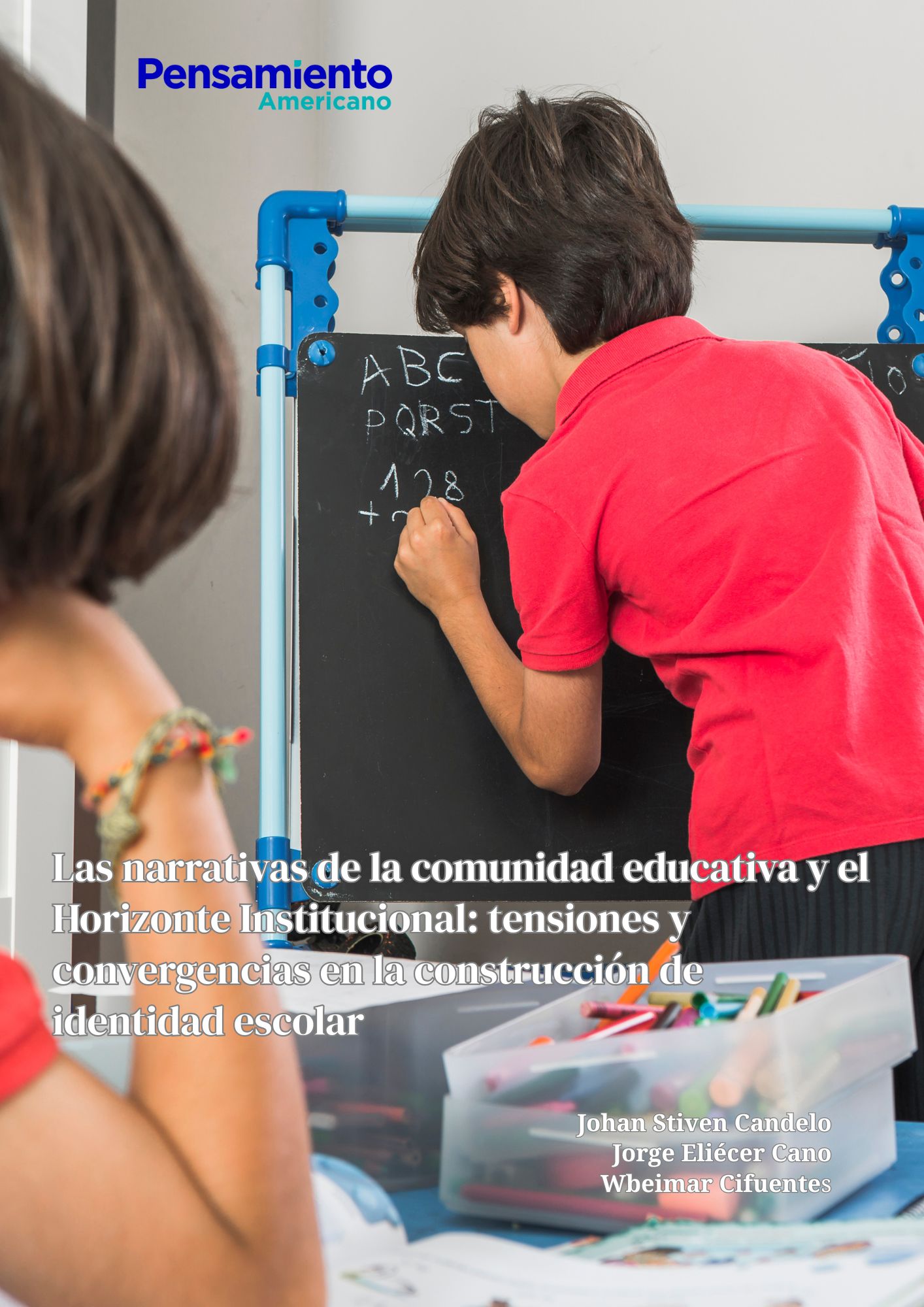As Narrativas da Comunidade Educativa e o Horizonte Institucional: Tensões e Convergências naConstrução da Identidade Escolar
DOI:
https://doi.org/10.21803/penamer.18.38.926Palavras-chave:
Análise do discurso, Horizonte institucional, Identidade escolar, Narrativas educativas, Participação comunitáriaResumo
Introdução: Este estudo aborda a relação entre as narrativas da comunidade educativa e o Horizonte Institucional da Instituição Educacional Rural Carbonera, localizada no município de Andes (Antioquia). Busca-se compreender como as percepções e experiências dos atores escolares se relacionam com os princípios formais estabelecidos no documento institucional. Objetivo: Analisar as relações entre as narrativas de estudantes, professores e pais, e os postulados do Horizonte Institucional, identificando convergências, dissonâncias e lacunas discursivas. Metodologia: A pesquisa adota uma abordagem qualitativa, com paradigma hermenêutico e um desenho baseado na análise do discurso. Foram utilizadas entrevistas semiestruturadas e matrizes conceituais para comparar os discursos comunitários com o texto institucional. Resultados: Os achados mostram que as narrativas locais incorporam categorias ausentes no documento oficial, revelando uma lacuna entre as vivências cotidianas e a normativa institucional. Essa distância evidencia a priorização de padrões externos em detrimento das particularidades contextuais. Conclusões: Propõe-se a reformulação do Horizonte Institucional a partir de uma identidade narrativa polifônica e inclusiva, capaz de refletir a realidade rural e fortalecer a escola como um espaço democrático e contextualizado.
Downloads
Referências
Althusser, L. (2013). Ideología y aparatos ideológicos del Estado. (F. Durand, Trad.). Siglo XXI Editores.
Audante Vicente y Soto Zedano, (2024). El proyecto educativo institucional y la gestión educativa en la I.E. Nuestra Señora del Carmen del distrito de Imperial. Igobernanza. Vol.7 / n°25, pp.120 - 135. ISSN: 2617-619X.
Bardin, L. (1986). Análisis de contenido. Akal.
Chávarro Ferrnandez, S. M. (2025). Aproximación al análisis del impacto generado por el proyecto educativo institucional “Petroglifos El Encanto” en la construcción de identidad cultural caqueteña. Debates Por La Historia, 13(1), 17–47. https://doi.org/10.54167/debates-por-la-historia.v13i1.1558
Denzin, N. K., & Lincoln, Y. S. (Eds.). (2018). The SAGE handbook of qualitative research (5th ed.). SAGE Publications.
Díaz Moreno, D. M., & Arias Moreno, Á. J. (2021). Herramientas de mejora curricular para fortalecer las necesidades específicas del aula multigrado en la IED José Hugo Enciso – sede Naranjitos, ciclo de primaria [Tesis de maestría, Universidad La Gran Colombia]. Repositorio Institucional Universidad La Gran Colombia. https://repository.ugc.edu.co/server/api/core/bitstreams/394ea62f-42d3-42c4-ae1b-7aea897f4ea3/content
Díaz-Barriga, F. (2006). Enseñanza situada: Vínculo entre la escuela y la vida. México: McGraw-Hill.
Duran Acosta, (1994). El proyecto educativo institucional [PEI] : una alternativa para el desarrollo pedagógico-cultural. Colección mesa redonda 2.0. ISBN 9789582001919.
Foucault, (2010). Arqueología del saber. Siglo XXI editores.
Foucault, (2013). Vigilar y castigar. Siglo XXI editores.
Foucault, M. (2002). Hermenéutica del sujeto: Curso en el Collège de France (1981–1982) (H. Pons, Ed.; H. Valencia, Trad.). Fondo de Cultura Económica.
Gadamer, H.-G. (1998). Verdad y método I (J. Mardones, Trad., 2.ª ed.). Ediciones Sígueme. (Obra original publicada en 1960).
García, A. (2009). El Proyecto Educativo Institucional: construcción y desarrollo. Editorial Magisterio.
Hincapié (2024). Pedagogía anómala. Editorial aula de humanidades.
Ricoeur, P. (1995). Tiempo y narración I: Configuración del tiempo en el relato histórico (A. Neira, Trad.). Trotta.
Ricoeur, P. (1996). Sí mismo como otro (D. Schon, Trad.). Siglo XXI Editores. (Obra original publicada en 1990)
Runge Peña, A. K. (2008). Heterotopías para la infancia: reflexiones a propósito de su “desaparición” y del “final de su educación”. Revista Latinoamericana de Ciencias Sociales, Niñez y Juventud, (6)1, 31-53.
Van Dijk, T. A. (2003). El discurso como estructura y proceso. Gedisa.
Van Dijk, T. A. (2005). Ideología y discurso: una introducción multidisciplinaria. Ariel.
Nussbaum, (2018). La monarquía del miedo. Ediciones Paidos.

Downloads
Publicado
Edição
Seção
Licença
Copyright (c) 2025 Pensamiento Americano

Este trabalho está licenciado sob uma licença Creative Commons Attribution-NonCommercial-NoDerivatives 4.0 International License.
The author or authors of an article accepted for publication in the Journal Pensamiento Americano will transfer all of the patrimonial rights to the American University Corporation free of charge, within which are included: the right to edit, publish, reproduce and distribute both print media as digital, in addition to include in article in international indexes and / or databases, likewise, the Editorial Seal is authorized to use the images, tables and / or any graphic material presented in the article for the design of covers or posters from the same magazine. By assuming the patrimonial rights of the article, it may not be partially or totally reproduced in any printed or digital media without its express permission.
AUTHORITY ASPECTS
For the Pensamiento Americano Journal, all the authors of an article have made substantial contributions to the research and the manuscript, and they share the responsibility when the article presents errors, fraud in some way or violations of copyright.
After submitting an article, the journal does not accept the addition, deletion or change in the order of the authors, in addition we reserve the right to release the article when it has been submitted to the journal and under no circumstances will American Thought accept the article. withdrawal of an article during any phase of the editorial process





